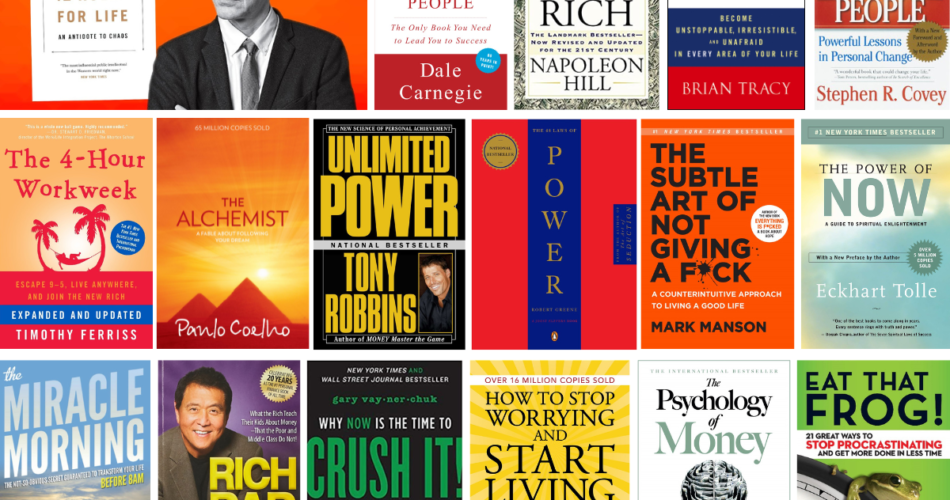Personal development books are among the best-selling books in the world. If they are so appreciated, it is because they are all bearers of hope, and some of them can clearly change the life of their readers. But how can you choose from such a rich and varied offer? In this article, you will discover 17 games changers in the personal development books arena.
Nowadays there are fewer people who read books or works of art. And this is very sad. It is better to go buy some glossy magazine or read posts on the Internet. And only those who want to develop a real personality and succeed start reading various books for self-development.
Books are an indispensable source of information in which people share their experiences, thus passing them down from generation to generation. On the subject of self-development, quite a number of books are published each year, and they are all very interesting. Without further due, let us dive into our list of the best personal development books.
#1. Think and Grow Rich by Napoleon Hill
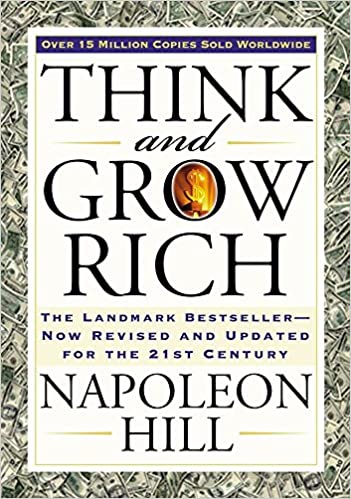
“Think and Grow Rich” by Napoleon Hill is an absolute game-changer in the realm of personal development and financial success. Hill’s timeless masterpiece encapsulates the principles necessary for achieving one’s goals, both financially and personally. The book delves into the power of one’s mindset and emphasizes the significance of a strong desire and clear goals.
Hill’s insights into the role of determination, persistence, and positive thinking in achieving prosperity are particularly inspiring. He provides a detailed roadmap for transforming thoughts into reality through careful planning and unwavering belief in one’s abilities.
The anecdotes and success stories of renowned individuals sprinkled throughout the book are not only motivating but also serve as evidence of the effectiveness of the philosophies espoused. The concept of a “mastermind” group, where collective knowledge and expertise fuel success, is a standout idea that has proven to be invaluable for many readers.
However, the book does require a thoughtful and patient reading, as some concepts may need to be revisited for a complete understanding. Despite being written several decades ago, the principles in “Think and Grow Rich” remain as relevant today as they were in Hill’s time.
In conclusion, “Think and Grow Rich” is an essential read for anyone seeking to improve their mindset, set meaningful goals, and manifest success in all aspects of life. It’s a book that not only imparts valuable knowledge but also encourages readers to take actionable steps towards their dreams and aspirations.
#2. How to Win Friends & Influence People by Dale Carnegie
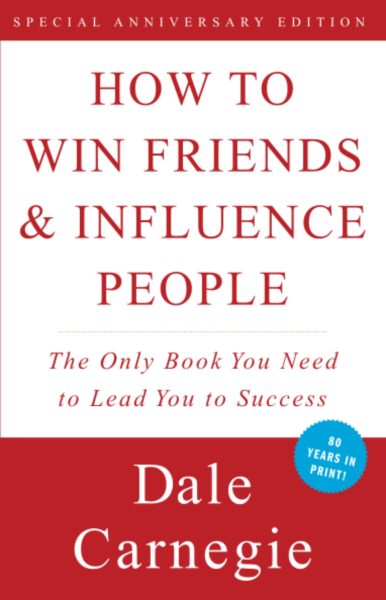
“How to Win Friends and Influence People” by Dale Carnegie is a timeless classic that transcends generations, offering invaluable insights into human relations and communication. Carnegie’s approach to understanding and interacting with people is not just about personal success but also about fostering meaningful connections in both personal and professional spheres.
The book is a treasure trove of practical advice, strategies, and anecdotes that guide readers in improving their interpersonal skills. Carnegie emphasizes the importance of genuine interest in others, active listening, and acknowledging people’s viewpoints. He encourages readers to be empathetic, understanding, and appreciative, ultimately showing that a little kindness and understanding can go a long way.
One of the book’s strongest aspects is its emphasis on positivity and how it can influence others. Carnegie’s lessons on handling criticism, avoiding arguments, and inspiring enthusiasm are particularly enlightening and provide actionable approaches to dealing with various social situations.
While some concepts may seem obvious, the book serves as a gentle reminder of the fundamental principles often overlooked in our busy lives. The anecdotes and real-life examples shared by the author add a relatable touch, making the book engaging and enjoyable to read.
Overall, “How to Win Friends and Influence People” is a must-read for anyone looking to enhance their social skills, build lasting relationships, and become a better communicator. The wisdom imparted in this book is timeless, and its lessons are as relevant and impactful today as they were when first published.
#3. The 7 Habits of Highly Effective People by Stephen Covey
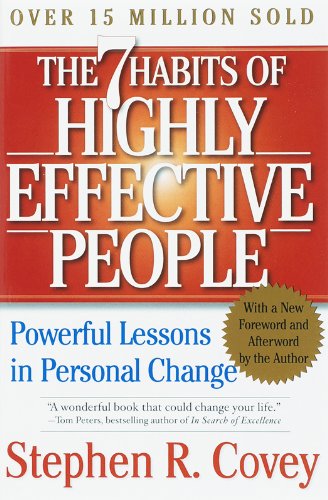
“The 7 Habits of Highly Effective People” by Stephen R. Covey is a transformative guide to personal and professional growth that has left an indelible mark on the self-help genre. Covey’s approach is deeply philosophical, offering readers a paradigm shift in how they perceive and approach life and its challenges.
The book centers around seven powerful habits that, when adopted and integrated into one’s daily life, lead to greater effectiveness and fulfillment. Covey begins by focusing on self-mastery, urging readers to take responsibility for their lives and actions. He then delves into concepts like beginning with the end in mind, prioritizing tasks effectively, seeking understanding before being understood, and valuing cooperation and collaboration.
One of the book’s strengths is its holistic approach, encouraging individuals to align their actions with their core values and principles. Covey’s emphasis on fostering genuine relationships, both personally and professionally, is particularly impactful.
The insights are backed by practical examples and exercises, making the concepts easily applicable in real-life scenarios. The timeless wisdom contained within this book encourages readers to reflect on their current paradigms and motivates them to strive for continuous improvement.
In conclusion, “The 7 Habits of Highly Effective People” is a monumental work that has stood the test of time, offering a roadmap for anyone seeking to enhance their effectiveness, productivity, and overall quality of life. It’s a compelling read for those looking to cultivate a balanced, meaningful, and purpose-driven existence.
#4. The power of self-confidence by Brian Tracy
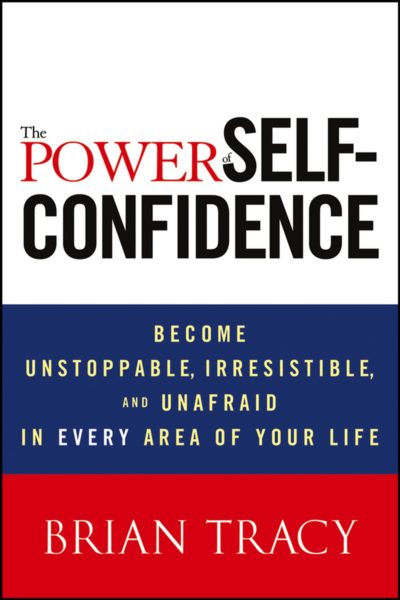
“The Power of Self-Confidence” by Brian Tracy is a dynamic and insightful book that tackles the essential trait of self-confidence and its profound impact on personal and professional success. Tracy’s book is a valuable resource for individuals looking to boost their self-esteem and unlock their potential.
The author begins by deconstructing the components of self-confidence and how it influences every facet of life, from career advancements to relationships. Tracy provides actionable strategies and practical exercises to help readers develop a strong sense of self-belief and conquer self-doubt.
What sets this book apart is Tracy’s emphasis on the power of positive thinking and visualization in building confidence. He encourages readers to set clear goals and visualize their achievements, instilling a sense of purpose and determination.
The real-life examples and anecdotes shared by Tracy add authenticity and relatability to the book. He covers a range of topics, including overcoming fear of failure, mastering public speaking, and maintaining a positive attitude, all of which contribute to the development of self-confidence.
“The Power of Self-Confidence” is a motivating and empowering read that equips readers with the tools needed to cultivate unwavering confidence in themselves. It’s a handbook for personal growth and self-empowerment, urging individuals to step into their full potential and lead successful, fulfilling lives.
#5. The 4-Hour Workweek by Tim Ferriss
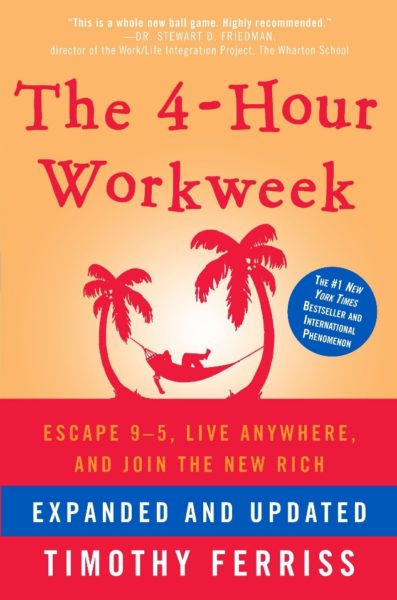
“The 4-Hour Workweek” by Timothy Ferriss is a groundbreaking book that challenges conventional notions of work, lifestyle, and success. Ferriss introduces a new paradigm where individuals can escape the 9-to-5 grind and design a life rich in freedom, adventure, and meaningful experiences.
At the core of this book is the concept of lifestyle design, where Ferriss encourages readers to define their own version of success and create a flexible work-life balance. He advocates for maximizing productivity and efficiency to work smarter, not harder, and reclaim precious time for personal pursuits.
Ferriss shares practical tips and tools, such as outsourcing tasks and utilizing technology, to achieve a more streamlined and effective approach to work. The concept of “mini-retirements” and focusing on the activities that truly matter resonate strongly, prompting readers to rethink their priorities and goals.
Moreover, the book’s success stories and case studies inspire and provide evidence that Ferriss’s unconventional methods can yield significant results. He also explores the mindset shifts necessary to break free from societal norms and embrace a life of autonomy and purpose.
In summary, “The 4-Hour Workweek” is a liberating manifesto that challenges the traditional work ethos and motivates readers to take control of their lives. It’s a must-read for those seeking to escape the constraints of a traditional work model and create a lifestyle centered around passion, freedom, and fulfillment.
#6. The Alchemist by Paulo Coelho
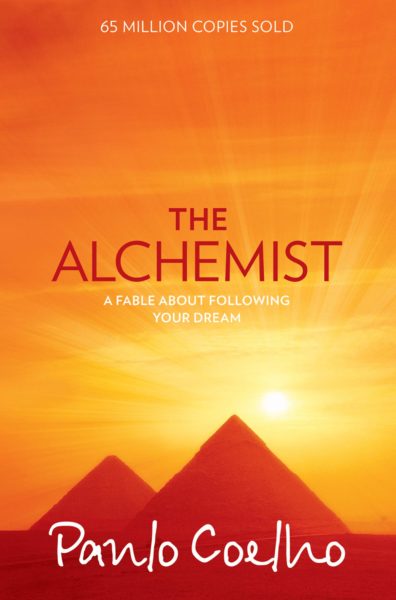
“The Alchemist” by Paulo Coelho is a profound and enchanting tale that weaves together elements of adventure, self-discovery, and the pursuit of dreams. Coelho’s narrative follows the journey of Santiago, a shepherd boy who embarks on a quest to fulfill his personal legend.
The book beautifully encapsulates the universal theme of following one’s heart and listening to one’s inner calling. Santiago’s quest for a hidden treasure serves as a metaphor for each individual’s unique life purpose, urging readers to have the courage to chase their dreams relentlessly.
Coelho’s writing is poetic and evocative, painting vivid imagery of Santiago’s travels through deserts, oases, and distant lands. The philosophical insights shared by the characters he encounters along the way add depth to the story, encouraging introspection and contemplation.
The overarching message of “The Alchemist” is about the transformative power of belief, resilience, and the willingness to overcome obstacles. Coelho inspires readers to embrace the journey, learn from setbacks, and ultimately discover the true treasures that lie within.
In conclusion, “The Alchemist” is a timeless masterpiece that continues to resonate with readers across the world. It serves as a beacon of hope and motivation, reminding us all to pursue our dreams with unwavering faith and determination.
#7. The 48 Laws of Power by Robert Greene
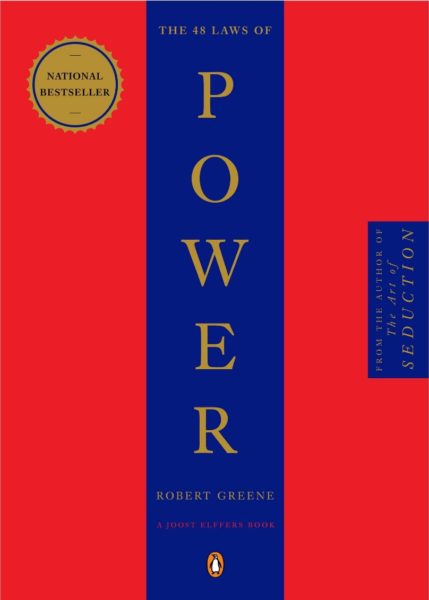
“The 48 Laws of Power” by Robert Greene is a compelling exploration of the dynamics of power and influence. Greene delves into the strategies, tactics, and timeless principles used by historical figures and contemporary influencers to attain and wield power effectively.
The book is structured around 48 laws, each accompanied by real-life historical anecdotes and examples, making it a captivating read. Greene’s unapologetic analysis of power dynamics provides valuable insights into human behavior, ambition, and strategic thinking.
However, it’s important to approach this book with a discerning mind, as some of the laws can be morally ambiguous or manipulative. Greene acknowledges this and emphasizes that knowledge of these laws can help individuals navigate power dynamics, whether to protect themselves or influence others.
“The 48 Laws of Power” is a thought-provoking read that challenges conventional norms and offers a peek into the darker aspects of human nature and ambition. Readers are encouraged to reflect on the laws, dissect the strategies, and decide how to apply or counter them in their own lives.
In summary, “The 48 Laws of Power” is a thought-provoking book that provides a deep understanding of power dynamics and human behavior, making it a valuable resource for those interested in mastering the art of influence and persuasion.
#8. Unlimited Power by Anthony Robbins
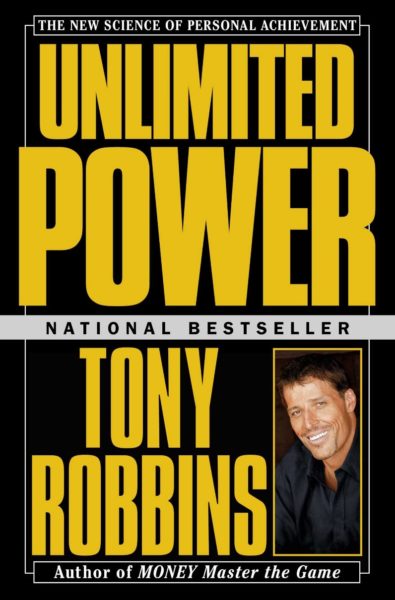
“Unlimited Power” by Tony Robbins is a dynamic and empowering book that delves into the vast potential of the human mind and its ability to shape one’s destiny. Robbins presents a comprehensive approach to personal and professional development, rooted in the understanding of the power of our thoughts, beliefs, and actions.
The book is structured around practical strategies to unleash one’s inner potential and create a life of purpose, passion, and success. Robbins emphasizes the role of beliefs and the power of positive conditioning, offering techniques to overcome limiting beliefs and reprogram the mind for success.
One of the notable aspects of “Unlimited Power” is Robbins’ adept use of neuro-linguistic programming (NLP) to help readers understand and influence their thought patterns and behaviors. Through NLP techniques, Robbins illustrates how individuals can transform their mental states to achieve peak performance in various areas of life.
Furthermore, Robbins shares captivating anecdotes and success stories, enhancing the book’s relatability and motivation. He encourages readers to take charge of their lives, set compelling goals, and adopt a proactive mindset.
In conclusion, “Unlimited Power” is an inspiring and transformative read for those seeking to unlock their potential and take their life to the next level. Robbins’ teachings empower readers to harness the power of their mind and cultivate a life of limitless possibilities and growth.
#9. The Power of Now by Eckhart Tolle
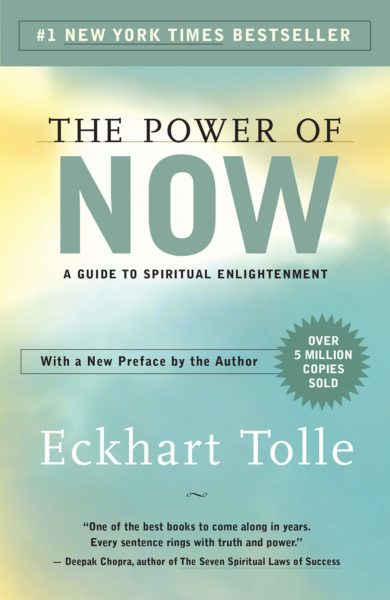
“The Power of Now” by Eckhart Tolle is a profound and illuminating spiritual guide that encourages readers to embrace the present moment and find inner peace and fulfillment. Tolle’s insights and teachings revolve around the significance of mindfulness and living in the now, free from the constraints of the past and anxieties about the future.
The book is a transformative journey, challenging the conventional notions of time and ego. Tolle explores the concepts of presence, consciousness, and the essence of being, illustrating how shedding attachments to the past and worries about the future can lead to a heightened state of awareness and joy.
One of the book’s strengths is its accessibility and clarity in explaining complex spiritual concepts. Tolle’s writing style is engaging, making profound ideas understandable and applicable to everyday life.
Moreover, Tolle offers practical exercises and meditations throughout the book, providing readers with tools to cultivate mindfulness and presence. The real-life examples and anecdotes shared by the author enhance the book’s relatability and resonate with readers seeking a deeper understanding of their own consciousness.
In summary, “The Power of Now” is a transformative guide for those seeking to break free from the confines of the mind and discover the profound peace and happiness that resides in the present moment. It’s an invitation to embrace a life of mindfulness, clarity, and spiritual awakening.
#10. The Subtle Art of Not Giving a F*ck” by Mark Manson
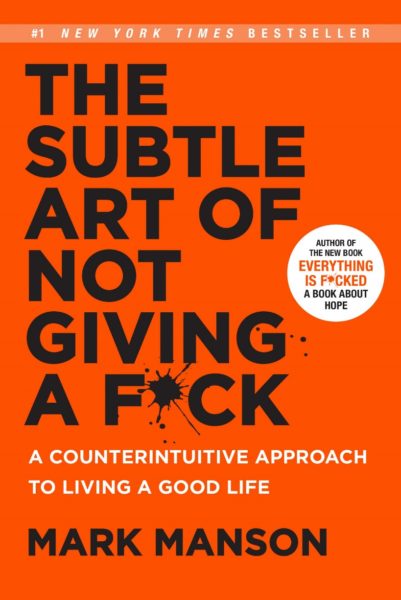
“The Subtle Art of Not Giving a F*ck” by Mark Manson is a refreshing take on self-help literature that challenges the traditional, overly positive approaches often found in the genre. Manson’s raw and candid narrative is a breath of fresh air, focusing on embracing life’s struggles and choosing meaningful values rather than pursuing constant happiness.
The book advocates for a more realistic and stoic perspective, urging readers to prioritize what truly matters and let go of the need for constant validation or endless positivity. Manson emphasizes the importance of accepting our limitations and turning adversity into growth opportunities.
One of the book’s standout qualities is Manson’s engaging writing style and his ability to seamlessly blend humor, personal anecdotes, and profound insights. The language is straightforward and relatable, making the book accessible to a wide range of readers.
“The Subtle Art of Not Giving a F*ck” is a powerful guide for those looking to reevaluate their beliefs, confront uncomfortable truths, and redefine their priorities. It encourages readers to take responsibility for their lives and focus on what truly adds value and meaning, ultimately leading to a more purposeful and fulfilling existence.
In conclusion, this book is a compelling read for anyone seeking a pragmatic, no-nonsense approach to self-improvement and personal growth. It challenges conventional wisdom and offers a refreshing perspective on how to lead a life guided by authenticity and resilience.
#11. Rich dad, poor dad by Robert Kiyosaki
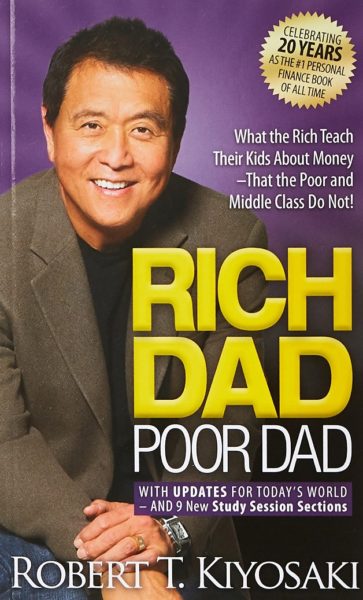
“Rich Dad Poor Dad” by Robert T. Kiyosaki is a groundbreaking personal finance classic that challenges conventional views on wealth and success. Kiyosaki recounts his childhood experiences and the invaluable financial lessons he learned from two father figures: his biological father (whom he calls “Poor Dad”) and the father of his childhood friend (whom he calls “Rich Dad”).
The book distills key principles about money management, investment, and wealth creation, making it accessible to readers from all backgrounds. Kiyosaki emphasizes the importance of financial education, assets versus liabilities, and cultivating a mindset that embraces opportunities and risk.
One of the book’s strengths is its simplicity and practicality. Kiyosaki breaks down complex financial concepts into easily digestible anecdotes and lessons, making it relatable for readers with varying levels of financial literacy.
Moreover, “Rich Dad Poor Dad” is not just about financial strategies but also about fostering an entrepreneurial mindset and taking control of one’s financial destiny. The book encourages readers to think critically about their financial decisions, set clear goals, and build a diversified portfolio of assets.
In conclusion, “Rich Dad Poor Dad” is an inspiring and thought-provoking read that challenges traditional beliefs about money and empowers readers to take charge of their financial future. It’s a must-read for anyone seeking financial independence and a roadmap to achieving lasting prosperity.
#12. The Miracle Morning by Hal Elrod
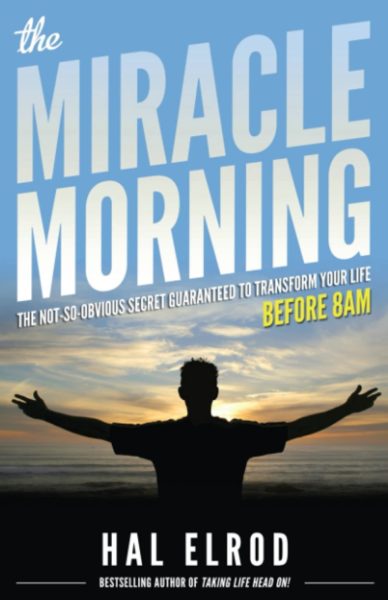
“The Miracle Morning” by Hal Elrod is a transformative book that advocates for a powerful morning routine to kickstart a fulfilling and productive day. Elrod introduces a set of rituals called the SAVERS—Silence, Affirmations, Visualization, Exercise, Reading, and Scribing—to optimize the beginning of each day and set a positive tone for the rest.
The book is structured around these practices, each designed to nourish the mind, body, and soul. Elrod provides insights into the potential of morning habits to enhance productivity, focus, and overall well-being. He stresses the importance of a proactive morning routine in shaping one’s mindset and determining the trajectory of one’s day.
What sets “The Miracle Morning” apart is its practicality and adaptability. Elrod encourages readers to tailor the routine to their needs and preferences, making it an inclusive approach for individuals with different lifestyles and schedules.
Additionally, the book is enriched with personal anecdotes and success stories, adding a relatable touch and inspiring readers to embrace the Miracle Morning routine.
In summary, “The Miracle Morning” is an empowering read that guides readers to cultivate a morning ritual that propels them toward success and fulfillment. It’s a blueprint for a proactive and intentional start to the day, promising transformative results in both personal and professional aspects of life.
#13. Crush It!: Why NOW Is the Time to Cash In on Your Passion by Gary Vaynerchuck
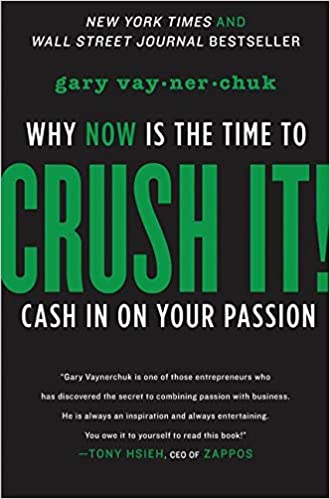
“Crush It!: Why NOW Is the Time to Cash In on Your Passion” by Gary Vaynerchuk is a motivational and entrepreneurial book that encourages readers to turn their passions into profitable ventures in the digital age. Vaynerchuk’s energetic and no-nonsense approach drives home the message that anyone can leverage their interests and expertise to build a successful personal brand and business.
The book is an inspiring guide that outlines how to use social media platforms, online tools, and the power of authenticity to create a strong personal brand. Vaynerchuk emphasizes the importance of hard work, dedication, and perseverance in the pursuit of one’s passions.
What sets “Crush It!” apart is Vaynerchuk’s relatability and real-world success stories. He uses his own journey and those of others to illustrate how determination and a strategic approach can lead to significant opportunities and financial success.
Moreover, the book offers actionable advice and practical tips for individuals to establish an online presence, build an engaged community, and monetize their passions effectively.
In conclusion, “Crush It!” is a compelling read for aspiring entrepreneurs and individuals looking to turn their hobbies and passions into profitable ventures. It’s a call to action to embrace the digital landscape and make a mark by doing what you love.
#14. How To Stop Worrying and Start Living – Dale Carnegie
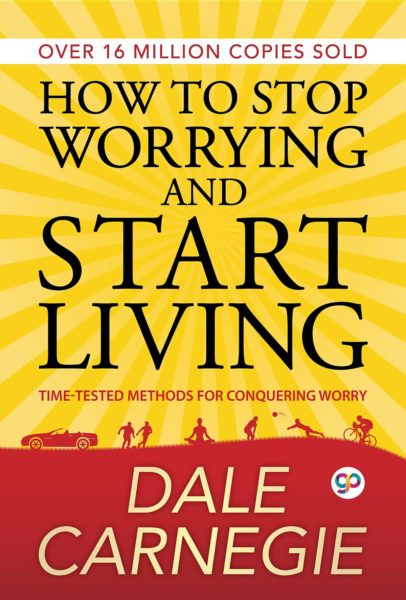
“How to Stop Worrying and Start Living” by Dale Carnegie is a timeless self-help classic that provides actionable strategies to overcome worry and anxiety, leading to a more fulfilled and peaceful life. Carnegie’s approach is practical and rooted in real-life experiences, making the book highly relatable and effective.
The book is structured around proven principles and techniques to manage stress and worry. Carnegie shares anecdotes and case studies that illustrate how individuals from various walks of life have successfully tackled their worries and emerged stronger.
One of the book’s strengths is its emphasis on shifting one’s perspective and focusing on the present moment. Carnegie encourages readers to face their fears and confront challenges head-on, offering methods to deal with stressful situations with grace and resilience.
Moreover, the book provides a range of helpful advice, from practical tips on time management to fostering positive relationships and staying optimistic. The holistic approach ensures that readers can apply these principles to various aspects of their lives.
In summary, “How to Stop Worrying and Start Living” is a valuable guide for anyone seeking to manage their worries and lead a more contented life. It’s an empowering read that equips readers with the tools to take charge of their mental well-being and embrace each day with a positive outlook.
#15. Eat that frog by Brian Tracy.
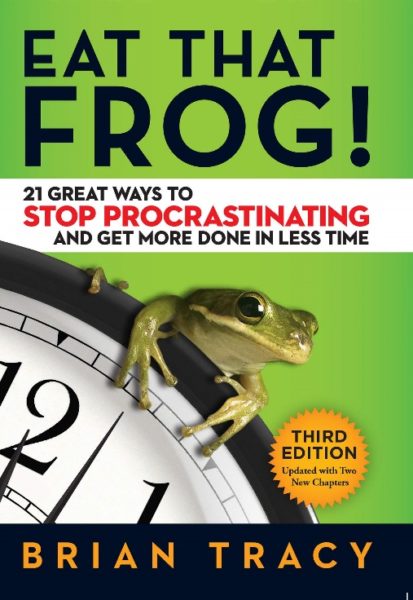
“Eat That Frog!” by Brian Tracy is a compact, yet impactful, self-help book that offers a wealth of practical advice on time management, productivity, and achieving one’s goals. The metaphor of “eating the frog” encapsulates tackling the most challenging or unpleasant tasks first, setting the tone for a highly productive day.
Tracy’s approach is structured around actionable strategies that can be easily applied to everyday life. He outlines techniques to prioritize tasks, manage time efficiently, and maintain focus amidst distractions. The book emphasizes the importance of goal setting and provides a roadmap to turn aspirations into accomplishments.
One of the book’s strengths lies in its simplicity and clarity. Tracy’s writing is straightforward and to the point, making it accessible for readers of all backgrounds and professions. The concepts are easy to understand and implement, enhancing productivity and reducing procrastination.
Additionally, Tracy incorporates anecdotes and success stories that resonate with readers, reinforcing the effectiveness of the principles he advocates. The book’s practicality and relatability make it a valuable resource for anyone striving to enhance their productivity and achieve their objectives.
In conclusion, “Eat That Frog!” is a valuable and practical guide for individuals seeking to boost their productivity, prioritize effectively, and attain their goals. It’s a roadmap to conquer procrastination and make significant strides toward success and personal fulfillment.
#16. The Psychology of Money by Morgan Housel
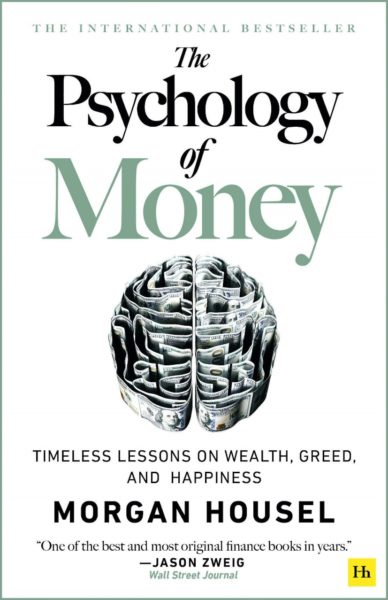
“The Psychology of Money” by Morgan Housel is a thought-provoking and insightful exploration of the psychological factors that influence our financial decisions and behaviors. Housel delves into the complexities of money management, offering a blend of psychology, economics, and personal anecdotes to unravel the mysteries of financial decision-making.
The book presents a refreshing perspective on money, emphasizing the role of human emotions, biases, and perceptions in shaping financial outcomes. Housel highlights the importance of understanding one’s relationship with money and how it impacts long-term financial success.
One of the book’s strengths is its relatability and storytelling approach. Housel uses engaging narratives to convey valuable lessons, making complex financial concepts accessible and interesting to readers of all backgrounds. The anecdotes, drawn from historical events and individuals’ experiences, help drive home the book’s key messages effectively.
Moreover, “The Psychology of Money” provides practical insights and actionable advice on managing money wisely, investing with a long-term mindset, and avoiding common pitfalls. It encourages readers to reevaluate their financial goals and decisions, fostering a healthier and more productive approach to wealth creation and preservation.
In summary, “The Psychology of Money” is a compelling read for anyone interested in gaining a deeper understanding of the human psychology behind financial decisions. It’s a valuable resource that challenges traditional notions of finance and wealth, ultimately guiding readers toward a more mindful and successful financial future.
#17. 12 Rules for Life: An Antidote to Chaos by Jordan Peterson
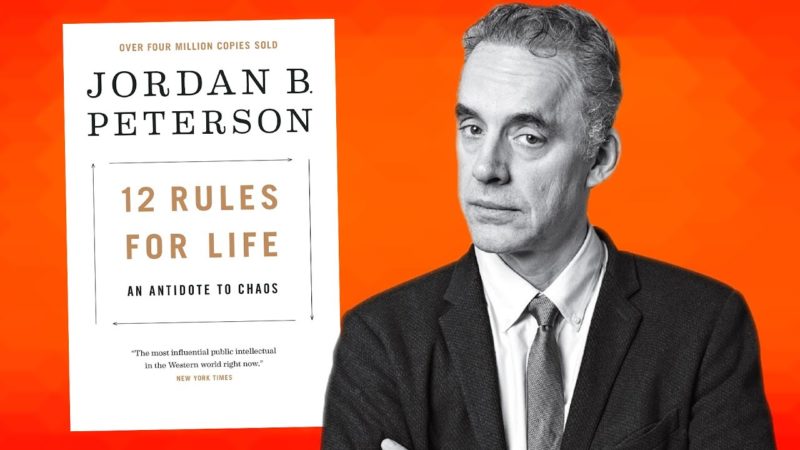
“12 Rules for Life: An Antidote to Chaos” by Jordan B. Peterson is a profound and intellectually stimulating book that delves into the fundamental principles for leading a meaningful and well-ordered life. Peterson combines psychology, philosophy, mythology, and personal anecdotes to offer practical guidance and wisdom.
The book is structured around twelve insightful and thought-provoking rules, each addressing a fundamental aspect of human behavior and existence. Peterson’s approach is pragmatic, encouraging readers to take responsibility for their lives, confront adversity, and strive for personal growth.
One of the book’s notable aspects is its integration of ancient wisdom and modern psychology. Peterson draws on a wide range of cultural and historical references to elucidate his points, making the book rich in diverse perspectives and universally relevant.
Moreover, Peterson’s engaging and articulate writing style makes the book accessible and compelling. He tackles complex ideas with clarity and depth, engaging readers in introspection and encouraging them to rethink their approach to life’s challenges.
In conclusion, “12 Rules for Life” is a captivating and thought-provoking read that challenges readers to question their beliefs, confront chaos, and embrace responsibility. It’s a guide to cultivating order, meaning, and purpose in an often unpredictable world.

